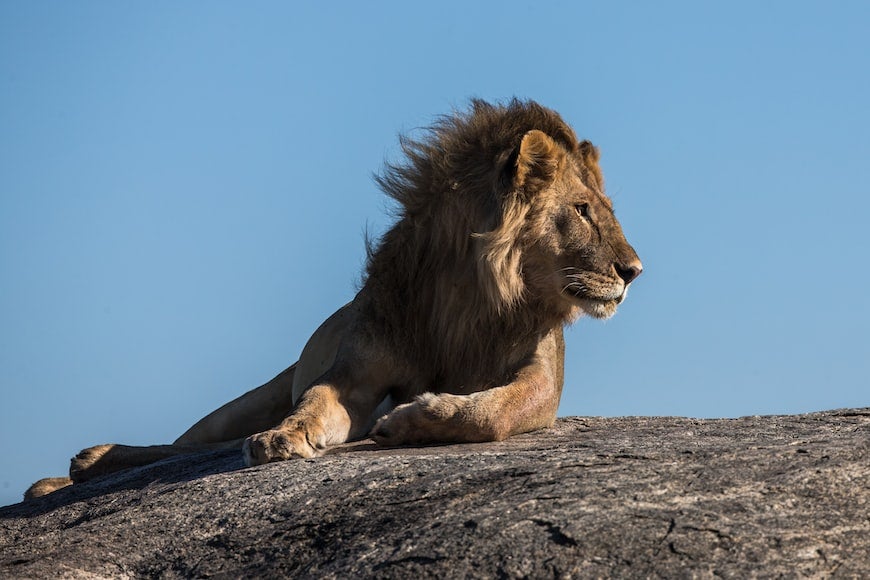Text-messaging lions and grouped cattle herds limit conflict between people and wildlife in Botswana
Lion populations rebound after innovations to keep people and livestock safe from wildlife attacks, reducing retaliation

By Keletso Thobega for Midweek Sun
A lion tracking system is proving to be successful in Botswana’s Okavango farming area with over 20,000 alerts recorded through its SMS system since last year. The system was introduced by CLAWS (Communities Living Among Wildlife Sustainably) Conservancy Botswana, which was established in 2014.
Dr Andrew Stein, Founder and Director of Claws Botswana, said that they have put satellite tracking collars on the lions and had the villagers give the lions local names to foster a connection.
“The collars transmit the locations of the lions to a cloud-based platform that calculates the distance from the lions to each of the villages, homesteads and cattle posts, then delivers an SMS to anyone that the lion is approaching,” Stein said.
“Once the warning is received the respondent can take preventative actions like kraaling [gathering together] their cattle and building small fires to deter lions from attacking the cattle.”
Stein said they observed that with humans and wildlife living increasingly close to one another, it is important to find ways to bolster community involvement.
One of the biggest concerns is wildlife attacking livestock. Stein said that animals such as lions taking communities’ livestock often results in the wildlife being killed in retaliation.
“The consequences of such retaliatory killings are far-reaching, and other species such as cheetahs and vultures, also suffer,” he said.
In terms of protecting livestock, Stein explained that the whole idea is to return to the traditional way of herding livestock, which saw them accompanied by herders, making it difficult for wild animals to prey on them.
He also said that the project groups herds together in order to reduce the cost, adding that the system has many benefits.
“An additional advantage is that grazing becomes better controlled, thus reducing the damage to grasslands and cutting back on land degradation,” Stein said.
The area lost many cattle to lions and leopards before the programme started but things have now improved.
“Farmers are optimistic and many want the project spread to their areas, and are interested in joining,” Stein added.
Stein works alongside Edwin Mudongo who was with the Department of Wildlife prior to joining Claws Botswana. Stein himself holds a PHD in Wildlife Conservation, while Mudongo has completed a PHD in rangeland ecology and climate change. Their practical experience and educational training has proved beneficial to operating conservancies in the area.
Mudongo said that the plan is to have many people from the area taking on the idea of community cattle herds and the interest and enthusiasm to the conservation programme are
also quite encouraging, as they also get to learn eco-literacy, rangeland restoration from overgrazing, and techniques for reducing lion conflict. Stein explained that the herding system can contribute to or solve the problem of predator attacks and environmental protection.
“Initially we brought together 20 people from each area around the Okavango area and facilitated workshops and training to teach them on protection of ecosystems and how to complement the traditional herding system with modern holistic management.” Paul Dube, foreman of the Eretsha Communal Herd said that cattle in the area were easily attacked before the programme but that installing predator proof bomas has helped.
“Before we introduced this new system, locals used to poison and kill lions, hyenas and vultures to push them away, which was not good as it led to high deaths of wildlife. They are now more educated on low impact options that they can implement and appreciate that it is possible for humans and wildlife to co-exist,” he said.
Through the support of Claws Botswana, three eco-rangers Tlotlang Motsheko, Kelebogile Motshoi and Obonye Maphane were trained on herding at the Southern Africa Wildlife College.
“We grew up herding cattle in the traditional manner, but upskilling has allowed us to be more innovative as we strive to protect animals from predators,” Motshoi said.
Monnaaleso Sanga, farmer and community cattle herder leader in Eretsha, is the chairperson of Ipopeng, a community conservancy programme that watches over cattle and tries to mitigate
predator attacks. He said that since working with Claws Botswana, they have observed an improvement as they have better knowledge and improved skills.
“Claws Botswana has helped us find ways to heal sick animals and also introduce different ways to create coexistence between animals and humans. We also implement conservation projects to protect the environment and engage the community,” he said.
Setiwa Mojoo, chairperson of the community herding group in Eretsha said that they have benefitted from the training offered by Claws, and they now have better information and understanding on human-wildlife coexistence, and interventions to protect their lives and those of their livestock without resorting to killing the wild animals.
“Where there are wild animals, predator attacks can happen anytime and the lion tracking system has helped to alert us when lions are in the vicinity. We also want residents to know that they can protect their livestock without resorting to killing them. Many residents can now see that it is possible to co-exist with wild animals,” she said.
This article is reproduced here as part of the African Conservation Journalism Programme, funded in Angola, Botswana, Mozambique, and Zimbabwe by USAID’s VukaNow: Activity. Implemented by the international conservation organization Space for Giants, it aims to expand the reach of conservation and environmental journalism in Africa, and bring more African voices into the international conservation debate. Written articles from the Mozambican and Angolan cohorts are translated from Portuguese. Broadcast stories remain in the original language.
Read the original story here:

Join our commenting forum
Join thought-provoking conversations, follow other Independent readers and see their replies